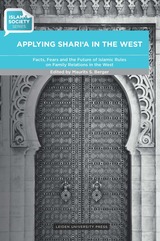
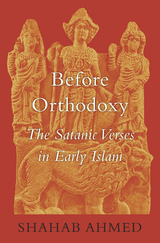
One of the most controversial episodes in the life of the Prophet Muhammad concerns an incident in which he allegedly mistook words suggested by Satan as divine revelation. Known as the Satanic verses, these praises to the pagan deities contradict the Islamic belief that Allah is one and absolute. Muslims today—of all sects—deny that the incident of the Satanic verses took place. But as Shahab Ahmed explains, Muslims did not always hold this view.
Before Orthodoxy wrestles with the question of how religions establish truth—especially religions such as Islam that lack a centralized authority to codify beliefs. Taking the now universally rejected incident of the Satanic verses as a case study in the formation of Islamic orthodoxy, Ahmed shows that early Muslims, circa 632 to 800 CE, held the exact opposite belief. For them, the Satanic verses were an established fact in the history of the Prophet. Ahmed offers a detailed account of the attitudes of Muslims to the Satanic verses in the first two centuries of Islam and traces the chains of transmission in the historical reports known as riwāyah.
Touching directly on the nature of Muhammad’s prophetic visions, the interpretation of the Satanic verses incident is a question of profound importance in Islam, one that plays a role in defining the limits of what Muslims may legitimately say and do—issues crucial to understanding the contemporary Islamic world.
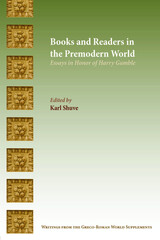
A book about the role of books in shaping the ancient religious landscape
This collection of essays by leading scholars from a variety of academic disciplines explores the ongoing relevance of Harry Gamble’s Books and Readers in the Early Church (1995) for the study of premodern book cultures. Contributors expand the conversation of book culture to examine the role the Hebrew Bible, the New Testament, and the Qur’an played in shaping the Jewish, Christian, and Muslim religions in the ancient and medieval world. By considering books as material objects rather than as repositories for stories and texts, the essays examine how new technologies, new materials, and new cultural encounters contributed to these holy books spreading throughout territories, becoming authoritative, and profoundly shaping three global religions.
Features:
- Comparative analysis of book culture in Roman, Jewish, Christian, and Islamic contexts
- Art-historical, papyrological, philological, and historical modes of analysis
- Essays that demonstrate the vibrant, ongoing legacy of Gamble’s seminal work
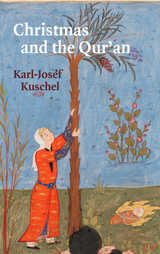
Christmas and the Qur’an is a sensitive and precise analysis of the Christmas story as it appears in the Gospels and the Qur’an. Karl-Josef Kuschel presents both scriptures in a convincing comparative exegesis and reveals startling similarities as well as significant differences. Kuschel explores how Christians and Muslims read these texts and reveals an intertwining legacy that serves as a base for greater understanding. Without leaving the realm of theology, Kuschel approaches his analysis in a theocentric way by emphasizing the shared belief that God is almighty, which, he argues, can act as a healing suture between Christianity and Islam. Christmas and the Qur’an gives the reader the chance to remember the message of hope that the birth of Jesus brings and invites to a dialogue between Muslims and Christians.
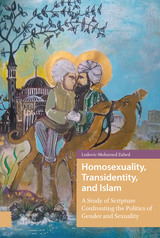
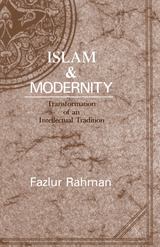
"In this work, Professor Fazlur Rahman presents a positively ambitious blueprint for the transformation of the intellectual tradition of Islam: theology, ethics, philosophy and jurisprudence. Over the voices advocating a return to Islam or the reestablishment of the Sharia, the guide for action, he astutely and soberly asks: What and which Islam? More importantly, how does one get to 'normative' Islam? The author counsels, and passionately demonstrates, that for Islam to be actually what Muslims claim it to be—comprehensive in scope and efficacious for every age and place—Muslim scholars and educationists must reevaluate their methodology and hermeneutics. In spelling out the necessary and sound methodology, he is at once courageous, serious and profound."—Wadi Z. Haddad, American-Arab Affairs
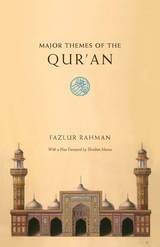
Major Themes of the Qur’an is Fazlur Rahman’s introduction to one of the richest texts in the history of religious thought. In this classic work, Rahman unravels the Qur’an’s complexities on themes such as God, society, revelation, and prophecy with the deep attachment of a Muslim educated in Islamic schools and the clarity of a scholar who taught for decades in the West.
“Generations of scholars have profited from [Rahman’s] pioneering scholarly work by taking the questions he raised and the directions he outlined to new destinations.”--Ebrahim Moosa, from his new foreword
“The religious future of Islam and the future of interfaith relationship . . . will be livelier and saner for the sort of Quranic centrality which Major Themes of the Qur’an exemplifies and serves.”--Kenneth Cragg, Middle East Journal
“There shines through [a] rare combination of balanced scholarly judgment and profound personal commitment. . . . [Rahman is] eager to open up the mysteries of the Qur’an to a shrinking world sorely in need of both moral regeneration and better mutual understanding.”--Patrick D. Gaffney, Journal of Religion
“I can’t think of any book more important, still, than Major Themes of the Qur’an.”--Michael Sells, author of Approaching the Qur’an
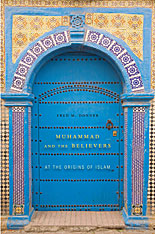
The origins of Islam have been the subject of increasing controversy in recent years. The traditional view, which presents Islam as a self-consciously distinct religion tied to the life and revelations of the prophet Muhammad in western Arabia, has since the 1970s been challenged by historians engaged in critical study of the Muslim sources.
In Muhammad and the Believers, the eminent historian Fred Donner offers a lucid and original vision of how Islam first evolved. He argues that the origins of Islam lie in what we may call the "Believers' movement" begun by the prophet Muhammad—a movement of religious reform emphasizing strict monotheism and righteous behavior in conformity with God's revealed law. The Believers' movement thus included righteous Christians and Jews in its early years, because like the Qur'anic Believers, Christians and Jews were monotheists and agreed to live righteously in obedience to their revealed law. The conviction that Muslims constituted a separate religious community, utterly distinct from Christians and Jews, emerged a century later, when the leaders of the Believers' movement decided that only those who saw the Qur'an as the final revelation of the One God and Muhammad as the final prophet, qualified as Believers. This separated them decisively from monotheists who adhered to the Gospels or Torah.
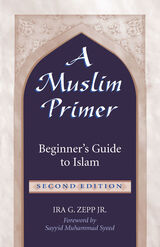
A Muslim Primer covers the basic beliefs of Islam and provides an informative source for both lay and professional readers. First published in 1992, it has proven to be a valuable handbook for all attempting to better understand the tenets of the religion of a major portion of the world’s population. The reader is introduced to the authority of the Quran, the prophethood of Muhammad, the Wisdom of the Law, the Five Pillars of Islam, and to other fundamental principles of the religion. Distinctions are made between Sunni and Shiite traditions and the Sufi mystical dimension of Islam.
Well organized, visually appealing, and accurate, A Muslim Primer is useful to pre-collegiate and collegiate students of Islam, church and community study groups, and travelers, both tourists and business people.
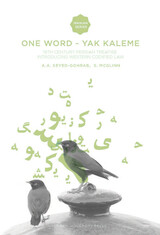
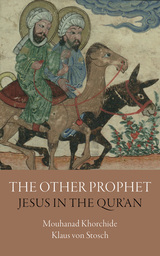

Iblīs, the character in the Qur’an who refuses God’s command to bow to Adam and is punished by eviction from heaven, is commonly depicted as a fiendish character no different from Satan. However, some Sufi stories describe Iblīs as the ultimate monotheist, a lover of God, but tragically rejected. This volume seeks the origins of this alternative Iblīs within the Qur’an itself, by looking at each of the seven Qur’anic versions of the Iblīs story as a unique rendering of the basic narrative. Whitney Bodman finds that the likely earliest version of the Iblīs story presents him as a tragic figure, an elder sibling of Adam unjustly displaced from God’s favor. Subsequent renderings present an Iblīs more hostile to humanity, and in the last two abbreviated versions Iblīs becomes an incidental figure in the extended story of Adam.
In modern Arab literature the character of Iblīs is deployed to reveal tragic dimensions of modern life. Although it is often said that there is no place for tragedy in Islam, Bodman’s careful examination of the Iblīs story shows that the tragic exists even in the Qur’an and forms part of the vision of medieval Sufi mystics and modern social critics alike.
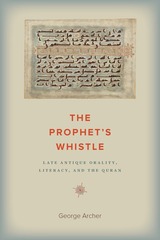
The Prophet’s Whistle is a study of the ancient, nonliterary features of the Quran, many of which are often overlooked by historians and the public. George Archer corrects this striking absence by using observations from the anthropologies of living oral cultures, the cognitive sciences of literacy, and the study of other dead oral cultures. The Prophet’s Whistle shows that the thought systems of the Quran are oral, through and through, but by the end of the life of its Prophet, the Quran likewise hints at a personal and cultural embrace of writing and the mindsets of literate people.
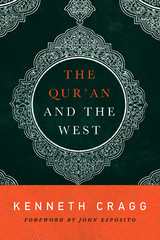
Kenneth Cragg (1913–2012) was one of the West's most gifted interpreters of Islam. In this deeply insightful, classic work of Qur’anic studies, he argues that the West must put aside a "spiritual imperialism" that draws on Western prescripts alien to Muslims and "learn to come within" Islam. Only then can a conversation begin that can relieve the misunderstandings and suspicion that has grown between Islam and the West in the years since 9/11.
Cragg’s close and thoughtful readings are as timely and relevant now as they were when The Qur'an and the West was originally published. With skill and nuance, he illuminates the difficulty that ensues through the Scripture's contradictory teachings on Islam's manifestation in the world—teachings that have brought about a crisis for modern Muslims living in both the West and the westernizing worlds, where a Muslim's obligation to Islamicize is met with anxiety and distrust.
The Qur'an and the West offers a means of study that reaches for a deeper knowledge of the Qur'an, engendering a new understanding of its holy teachings and opening a means for a fruitful discourse.
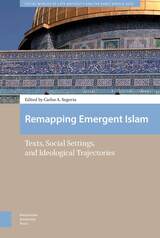
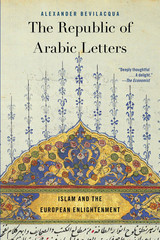
Winner of the Herbert Baxter Adams Prize
A Longman–History Today Book Prize Finalist
A Sheik Zayed Book Award Finalist
Winner of the Thomas J. Wilson Memorial Prize
A Times Literary Supplement Book of the Year
“Deeply thoughtful…A delight.”—The Economist
“[A] tour de force…Bevilacqua’s extraordinary book provides the first true glimpse into this story…He, like the tradition he describes, is a rarity.”
—New Republic
In the seventeenth and eighteenth centuries, a pioneering community of Western scholars laid the groundwork for the modern understanding of Islamic civilization. They produced the first accurate translation of the Qur’an, mapped Islamic arts and sciences, and wrote Muslim history using Arabic sources. The Republic of Arabic Letters is the first account of this riveting lost period of cultural exchange, revealing the profound influence of Catholic and Protestant intellectuals on the Enlightenment understanding of Islam.
“A closely researched and engrossing study of…those scholars who, having learned Arabic, used their mastery of that difficult language to interpret the Quran, study the career of Muhammad…and introduce Europeans to the masterpieces of Arabic literature.”
—Robert Irwin, Wall Street Journal
“Fascinating, eloquent, and learned, The Republic of Arabic Letters reveals a world later lost, in which European scholars studied Islam with a sense of affinity and respect…A powerful reminder of the ability of scholarship to transcend cultural divides, and the capacity of human minds to accept differences without denouncing them.”
—Maya Jasanoff
“What makes his study so groundbreaking, and such a joy to read, is the connection he makes between intellectual history and the material history of books.”
—Financial Times
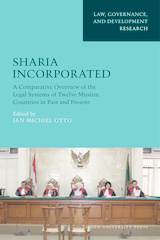
READERS
Browse our collection.
PUBLISHERS
See BiblioVault's publisher services.
STUDENT SERVICES
Files for college accessibility offices.
UChicago Accessibility Resources
home | accessibility | search | about | contact us
BiblioVault ® 2001 - 2024
The University of Chicago Press









